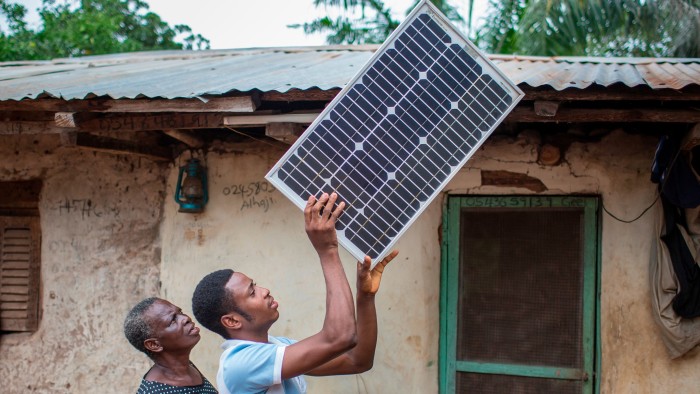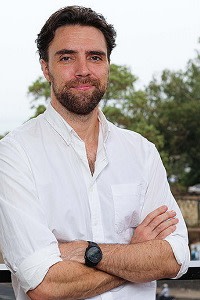Pitch perfect: how impact entrepreneurs can wow investors

Roula Khalaf, Editor of the FT, selects her favourite stories in this weekly newsletter.
When launching Sierra Leone-based start-up Easy Solar, Alexandre Tourre and his co-founders had to scramble for funds. “We were entering business plan competitions and going to hackathons,” he recalls. Now, after several successful funding rounds securing both debt and equity financing, he says investors still hear one message — how affordable clean energy changes lives in low-income communities in Africa — but the pitches are carefully tailored to different audiences.
This is because today’s impact investors come in many shapes and sizes: from institutional investors and fund managers to development finance institutions, foundations and individual investors. And different investors have different approaches — whether that is chasing market-rate returns, or investing “patient capital” which has far longer time horizons and prioritises social impact over financial gain.
“There are as many different goals as pots of money,” says Shari Loessberg, who teaches entrepreneurship and technological innovation at the MIT Sloan School of Management. “You have to understand what they care about and what they invest in and how they trade that off against how much return they’re expecting.”
What impact investors are looking for in terms of solutions to problems varies regionally, says Shuyin Tang, a partner at Patamar Capital, an impact-focused venture firm based in Vietnam.
“There are local flavours,” she notes. “In the US or Australia, it might be affordable housing. And it’s the same in Asia. But the big difference is that there is more absolute poverty in Asia, and the scale of hardship — especially after the pandemic — has definitely given impact businesses a lot more to do.”

For Easy Solar, which was born as a campus project at Columbia University, it helps that Tourre and his co-founders Nthabiseng Mosia and Eric Silverman have lived and worked in Africa.
This enables them to demonstrate to investors that they understand energy poverty and how to address it. In their case, that is through pay-as-you-go technology enabling low-income customers to use mobile money to pay for solar power and clean energy products, such as cookstoves and lanterns.
Local knowledge gives entrepreneurs another advantage when persuading investors to part with their money: a close personal connection to the problem. “That’s super important when you’re trying to address social and environmental issues,” says Tourre. “Because, if you take a theoretical approach, it can create a bit of a distance when you’re pitching.”
Of course, many impact pitches resemble those made to mainstream venture capital investors, says Liesel Pritzker Simmons of Blue Haven Initiative, a US-based impact-focused family office. What distinguishes them, she explains, is that founders must demonstrate that their enterprise is designed around solving a social problem and is not simply a for-profit business with social impact as an add-on.
“What we’re really looking for is whether this is a painful problem and, then, if the solution to that painful problem is tied to a business model,” she says.
Chid Liberty, co-founder of Liberty & Justice, a fair-trade-certified clothing company, stresses the need for impact entrepreneurs to demonstrate quality of leadership. “The most important thing is that people back people,” says Liberty, who has established a garment factory in Liberia to employ internally displaced women, as is also an impact investor.
“But it’s doubly hard for impact entrepreneurs,” he points out, “because you have to prove two things to them: that this person has what it takes to make the business work sustainably and they have the right heart to deliver on the impact.”
Nancy Pfund, founder and managing partner of DBL Partners, a San Francisco-based venture capital and impact investment firm, agrees. “You still have to do all the things that a traditional entrepreneur does,” she says. “But, when it comes to an impact proposition, what’s your theory of change? Is this going to move the needle? And how is your company going to do that?”
Above all, say impact investors, founders need to do their homework on the people they plan to pitch to — something that is getting easier, online.
“Between Google, LinkedIn and Crunchbase, you can find out everything you need to know about someone before you meet them,” says Liberty.
This was the case for one entrepreneur who recently approached Liberty. “They asked for a meeting with me, and I was shocked at how much they knew about me,” he says. “I find that really compelling.”
But getting to know a potential investor goes beyond reading a website bio. It means understanding their objectives and investment horizons, says Tourre. At Easy Solar, for example, investors range from Acumen, a patient-capital investor, to Gaia Impact Fund, a venture capital firm specialising in renewable energy, and to FMO, the Dutch development bank.
“It’s realising that not all impact investors have the same impact theory or care about the same type of impact,” he says. “So it’s important to align the way you present your story with the impact theory of the impact investor.”

Comments